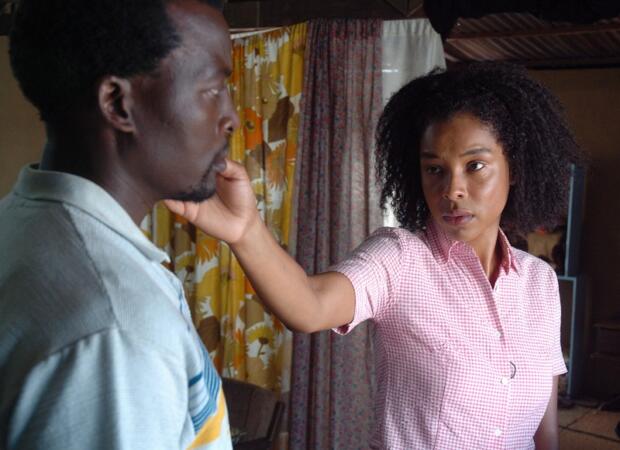
The Pan African Film Festival in Los Angeles kicked off 2 days ago, February 9, celebrating its 25th anniversary. Among the celebratory films selected to screen is British producer and director Anthony Fabian’s drama, “Skin,” starring Sophie Okonedo.
Based on a true story “Skin” looks at the life of Sandra Laing who, according to the Skin movie website synopsis, was the embodiment of a phenomenon I’m sure that most white South Africans at the time (and maybe even now) would like to deny existed: “…a black child born in the 1950s to white Afrikaners, unaware of their black ancestry. Her parents are rural shopkeepers serving the local black community, who lovingly bring her up as their ‘white’ little girl. But at the age of ten, Sandra is driven out of white society. The film follows Sandra’s thirty-year journey from rejection to acceptance, betrayal to reconciliation, as she struggles to define her place in a changing world – and triumphs against all odds.”
Before I go any further I’d just like to negate any suggestion that it was about a cheating wife trying to pass of another man’s child as her husband’s. True, there is brief allusion in the film to the husband’s supposedly unfounded suspicion and the fact that he abhors that his wife is so friendly with the kaffirs (blacks), but that’s not what the film is about.
With strong performances all round, my fear of it being overly melodramatic was almost unfounded, even from Sophie Okonedo, who can be a little over the top at times, seeming to forget to draw the line between stage and film acting.
The first question that struck me within the first few minutes of the film was why her parents (played by Sam Neil and Alice Krige), despite her obvious physical appearance, decided to have their daughter classified and identify as white, ill preparing her for a life outside of their rural outpost. They go so far as to enroll her in an all-white school in which she’s humiliated, alienated and finally forced to leave.
I can understand parents wanting to make a stand or to provide the very best for their child, but their level of denial, even to the point where they made her believe she was a little white girl, was never explored nor even how, given this was apartheid South Africa, she was even classified as white in the first place – especially when a particular scene goes to great and degrading lengths to explain and examine the physical traits that so obviously don’t make the ten year old girl (Ella Ramangwane) white.
Her parents then also proceed, as she gets older, to make her go out on dates with young white men who obviously do so out of neighbourly civility or to satisfy their young white male curiosity, and this despite the fact that the dress her mother buys for her courting sessions is bought with Sandra having to give her approval from outside the department store window because she’s not allowed into the building. As the movie was based on fact, this is just something that seemed like it could have been explored more intently, particularly with regard to how it affected Sandra emotionally and psychologically and even what was going through her parents’ minds.
Another issue for me was the rather rapid infatuation, rebellious courtship, honeymoon and then separation between Sandra and her black husband, by whom she had two children. Given the film’s 107 minutes and the fact that this seemed to be one of the few times in her young adult life that she actually found bliss, her relationship with her paramour (Tony Kgoroge) could have been better developed, particularly as he is virtually the only black male, aside from their son, portrayed in the film. As it was, it seemed as though it were just a set up to display how traumatic her forced separation from her white family was; an event that was no doubt tragic, but which was enforced by her father and later on carried out to the letter by her mother.
While the film did try to give Sandra’s perspective, it still felt very much like the heroic saga of a white family who were willing to go beyond the pale to redress the shame of their ancestral lineage by drawing attention to the very thing, or person, which denoted this past shame, and with scant regard for the innermost feelings or perspective of their only daughter.
I watched the film with a reinforced feeling of what I’ve always thought, that in racially mixed societies, whites are the controllers and arbiters of the identity of anyone who doesn’t share their skin colour; in this case, first it was Sandra’s parents, particularly her father, and then the state. When Sandra decides to take control of her own fate and identity, attempting to reclassify herself as coloured so that she can live with her black husband and raise her coloured children, it’s portrayed as a somewhat capricious, childish rebellion that is doomed to fail.
Despite these observations, however, it’s a story that certainly deserves to be told and which, no doubt in part thanks to white liberal feelings in these “post-racial” times, garnered many awards in its round of the film festival circuit a few years ago, and which I’d recommend, even if only for the originality of this infuriating tale, though not much for its sometimes haphazard and unfocused rendering.
Watch a trailer for “Skin” below.

